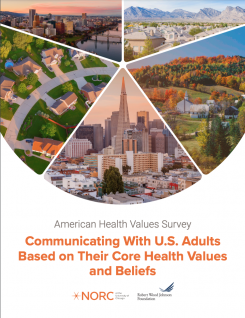About the survey
The American Health Values Survey captures insights into values and beliefs among U.S. adults about building a healthier and more equitable nation. There are also measures of what respondents believe about social determinants of health, the role of government in addressing them, and what they value most for their own communities. Using the results from the survey, the researchers created a typology or classification of U.S. adults based on their health values and beliefs. The typology presented here is based on the data from the second wave conducted in 2020.
The survey was conducted by NORC at the University of Chicago with support from the Robert Wood Johnson Foundation. The survey was conducted first in 2016 and then again in 2020. For both waves, data was collected using a multi-mode survey design from two samples, an address-based list sample and the NORC probability-based panel, AmeriSpeak. The Wave 1 (2016) dataset included a total of 10,574 respondents and the Wave 2 (2020) dataset included a total of 8,261 respondents.
